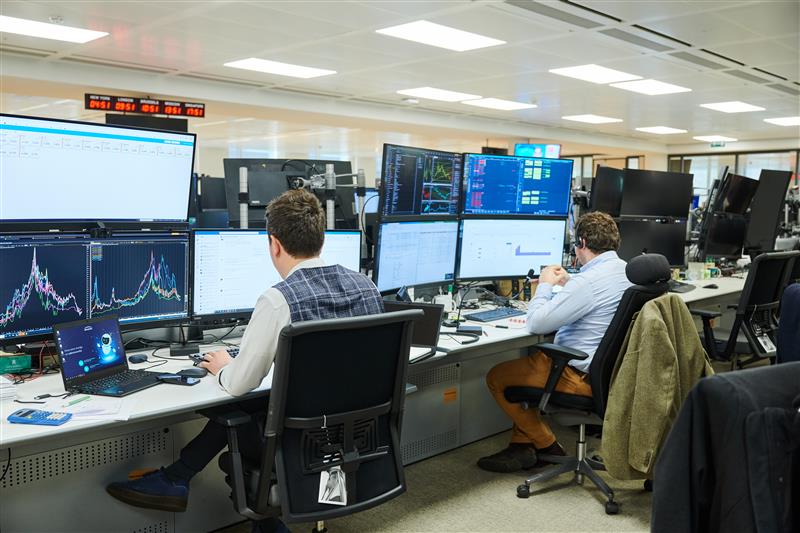
A brief history of the wholesale energy market
Prior to the 1990s, the EU wholesale energy market was regulated and controlled by governments. Competition was weak. Today, the wholesale energy market is both international and open. Independent operators can buy and sell electricity, natural gas and other energy products on a large scale.
The deregulation of the energy sector in most European countries has made the wholesale market more competitive and transparent, but also more volatile.
At the turn of the 2000s, a new phenomenon also brought changes to energy markets: the desire to develop renewable energies, with ambitious targets for governments and companies alike. This new situation diversified energy sources still further and made markets more complex.
What are commodities and how are they traded?
Commodities include energy products such as power, gas and oil. Commodities provide equivalent performance regardless of who produces them. They are used to produce services or finished products, which are then marketed to end customers.
Energy commodities can be traded on the stock exchange, or without an intermediary over-the-counter, between producers, suppliers and the main buyers, but also hedge funds, municipalities, etc.
Investors and traders can buy and sell commodities day to day, directly on the spot market or via so-called “structured” financial products, such as futures and options. In the latter case, the price is fixed when the contract is concluded, but delivery may be deferred for weeks, months or even years. This method of trading commodities offers economic players protection from highly volatile energy markets. Futures contracts enable companies and organizations to plan their production or operating costs with greater certainty and help energy suppliers to fix stable tariffs for their end customers.
Futures contracts and other structured products are driving the financialization of energy commodity markets. As a result, energy commodities are becoming popular assets for investors seeking to diversify their asset portfolios. Commodities have therefore become the focus of an evolving physical and financial market.
What factors influence commodity prices?
The volatility of prices at which electricity, gas and oil are traded is a major concern for all energy players, as well as for investors, governments and consumers.
The basic price dynamic is common to all markets: the balance between supply and demand. However, factors such as geopolitics, macroeconomic cycles, weather patterns, renewable energy availability, consumer behavior, government regulations, and technological developments constantly influence both supply and demand.. As a result, commodity prices are constantly changing by the hour, sometimes in staggering proportions. Ilyes Rasalingam, Energy Originator at ENGIE International Supply & Energy Management, shares a vivid personal anecdote: “
“I remember it like it was yesterday. There were rumors that Joe Biden was going to slap an embargo on Russian oil. When I arrived in the morning, gas opened at €180 per MWh. I went off for a coffee for 5 minutes, and when I came back, it was trading at €280! Then came Joe Biden’s announcement. I chatted with someone, and 10 minutes later, it had risen to €400/MWh! It ended the day at €280.”
What is an originator?
An originator is a professional who works for an energy supplier. As part of a team, he manages and develops a portfolio of companies. Originators offer their corporate clients value-creating financial and physical transactions by trading energy commodities. They analyze the structure and operation of each of their customers’ energy purchases and offer them structured products for managing their market risks more effectively, for example by contracting options to hedge price risk. As Ilyes Rasalingam explains, “It’s not a question of acquiring positions in the market, waiting for the price to go up or down and then selling to make a profit. Our asset is our customers so our job is to provide advice and support them to manage their risks. We support companies by creating deals that generate value both for them and for ENGIE.”
ENGIE and the commodities market
By managing ENGIE’s energy assets and those of its customers, ENGIE International Supply & Energy Management has developed unique expertise in the commodities market and management of the associated risks.
Because ENGIE is committed to achieving Zero Net Emissions by 2045, ENGIE International Supply & Energy Management and its teams of originators ensure that the energy transition is prioritized in decision-making models and in customer support. Moreover, the ESG team supports originators looking after decarbonization of ENGIE International Supply & Energy Management’ portfolio. Then they could refuse to make deal due to its bad carbon print, even if it would have been interesting on financial perspective.